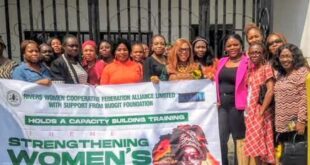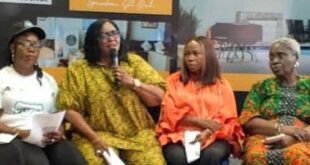By Kelechi Nwaucha
Against the backdrop of 16 Days of activism, Executive Director of OLEGH Centre for Community Development, Comrade Henry Eferegbo, has raised alarm over the rise and devastating impact of gender-based violence (GBV) on women and girls in the Niger Delta, particularly Rivers State.
This was as the Rivers State Response Team on Violence Against Women and Children reported over 2,212 cases of sexual and gender-based violence in the state for the year 2024 alone.
Addressing participants at a sensitisation workshop organised by OLEGH on the sidelines of the Niger Delta Women Day of Action for Environmental Justice, held by Kebetkache Women Development and Resource Centre in Port Harcourt on Friday, Comrade Henry Eferegbo pointed out that the 2,212 cases represent data from only one organisation.
He said it is expedient that government, society “and everyone, everywhere,” rise against this social menace, while lamenting the level of abuse of women and the girl-child by individuals in the society.
Speaking on the theme: ‘Stop the Silence, End Gender-Based Violence,’ before the gathering made up of community women from eight states of the Niger Delta (Edo, Imo, Rivers, Abia, Cross River, Delta, Akwa Ibom and Bayelsa), traditional rulers and religious leaders, Eferegbo highlighted the importance of the “30 years of advancing collective action to end violence against women and children.”
He equally frowned at the increasing rate of abuse suffered by women and girls in the hands of so-called leaders of. faith-based organisations, urging parents and women to be “cautious of the environment where their children go to.
“Most times, we usually rely on the faith-based organisations as a place where people could be safe. But today, some of them are found abusing children kept in their care. Many women have been left pregnant by those faith-based leaders. In so many families, the man has abandoned the wife and children to fend for themselves because of difficulty in their land.”
Commenting on the OLEGH-organised sensitisation session, Eferegbo said “We feel it’s important that we create this awareness, and also create an access where people who report issues of gender-based violence get the support they need. Because most times when you get issues of gender-based violence, the first attack is to look for those who have caused this damage and arrest them and deal with them. But the abused child, the victim, is left unattended.
“But now we are re-strategizing to see that the first call is the victim. Pick the victim, send her or him to the clinic, make sure the victim is restored to his or her normal health. And while that is going on, then you can now start seeking for justice for the victim. We want to ensure there are clinics where we can refer people to free of charge, and discreetly. And then they can go and get help, get treatment, proper treatment.”
He called for the enforcement of deterrents as a means of curbing gender-based violence. “In every society you find deviants. There was those who would behave as they are not supposed to. So what matters is, are there deterrents? Are there ways to discipline those who are involved to create deterrents?
“Unfortunately, the legal system and enabling laws are also making it difficult for most of the victims to get justice. I think the direction now is to see how to amend most of these … Acts currently existing, such that justice can easily be gotten.”
Eferegbo said OLEGH has set up a help-desk dedicated to issues of GBV and is working closely with the state task force on gender-based violence. “That’s why we brought the resource person from that committee to come and talk to our people, because we see how important this is.
“Right now we are also doing skills acquisition for women and girls. Quite a number of our beneficiaries are victims of gender-based violence. We believe that after the training, some of them will be able to fend for themselves and their babies even though their husbands had left them,” he said.
Resource person at the OLEGH workshop, Tombari Dumka-Kote, who is also the coordinator, Rivers State Response Team on Violence Against Women and Children, informed the gathering that “For the year 2024, we have 2,212 reported cases of sexual and gender-based violence.
“Of this number, we have 73 of these matters in different courts across the state. And I want to tell you that this matter and some of them have stayed for over 6 months without being resolved.”
Dumka-Kote said “We will all agree that violence is happening everywhere.It means, as we are seated in this hall, a woman, a man, a boy or a girl is having that experience.”
He told the participants that “While the meeting was going on, we just got a report on a hotline of a woman who was accused of abusing her four-year-old male help. We also got reports of a child, a five-year-old child, that is stolen around Rumuigbo axis of Port Harcourt. Now, these are the issues and more of that happened around us.
“But the most important thing for us is how do we respond when these issues happen around us? How do we respond? Where do we go to?
“The issue of response has become one thing that has been disturbing. Because even when people have this experience, even when people get into becoming survivors of violence, the challenge has been where do we go to and we are able to get support? Where do we go to and we are able to get the adequate response that is required?
“And the only way out is that you and me, everyone in this hall, everyone outside here in the communities, must put our hands together and say no to violence,” he said.
Participants at the sensitisation session, which included women, traditional rulers, religious leaders, civil society actors, members of the academia and media from eight states of the Niger Delta, agreed on the rising trend of domestic and sexual violence against women and girls in the society.
Chief Constance Meju, publisher of National Point Newspaper, noted the need for adequate safeguards for women, particularly young females, that would protect them from predators, while urging them to also protect themselves from potentially harmful situations.
 PH Mundial – Port Harcourt Online Newspaper News Across The Region
PH Mundial – Port Harcourt Online Newspaper News Across The Region





